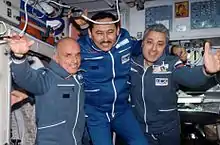The N-Prize (the "N" stands for "Nanosatellite" or "Negligible Resources".[1]) is an inducement prize contest intended to "encourage creativity, originality and inventiveness in the face of severe odds and impossible financial restrictions"[2] and thus stimulate innovation directed towards obtaining cheap access to space. The competition was launched in 2008[3] by Cambridge biologist Paul H. Dear,[4] and is intended specifically to spur amateur involvement in spaceflight as it is "aimed at amateurs, enthusiasts, would-be boffins and foolhardy optimists."[5]
Dr. Dear died on 11 March 2020, and the prize was subsequently closed.
The challenge posed by the N-Prize is to launch a satellite weighing between 9.99 and 19.99 grammes into Earth orbit, and to track it for a minimum of nine orbits. Most importantly the launch budget must be under £999.99 including the launch vehicle, all of the required non-reusable launch equipment hardware, and propellant.[5]
In order to be eligible for the awards the challenge initially had to be completed before 19:19:09 (GMT) on 19 September 2013, however later it was decided that the prize will remain open until won.[6] Doing so will earn the winning team a prize of £9,999.99.[7]
List of competing teams
The official site of the N-Prize includes an animated page listing over fifty teams together with contact information and links to any team websites.[8] Examples of teams[9] that have entered the competition at one time or another and who also have or had web pages include:
See also
References
- ↑ "Whimsical 'N-prize' to spur ultra-cheap space launches". New Scientist. 21 April 2008. Retrieved 21 March 2014.
- ↑ "Rules in full". N-Prize. §1. The Spirit of the N-Prize Challenge. Retrieved 21 March 2014.
intended to encourage creativity, originality and inventiveness in the face of severe odds and impossible financial restrictions.
- ↑ "Halfbakery: N-Prize". 13 February 2008. Retrieved 22 March 2014.
- ↑ "Paul H. Dear - Aerospace". Paul H. Dear. Retrieved 21 March 2014.
- 1 2 ""Nines" have it for Nanosatellite space race: The N-Prize". ITWire. 3 May 2008. Retrieved 21 March 2014.
- ↑ "N-Prize reopened". N-Prize. Retrieved 21 March 2014.
- ↑ "N-Prize Founder, Dr. Paul Dear Talks to the Space Fellowship about Starting up a Space Prize (with a Bottle of Pinot Grigio)". 16 June 2008. Retrieved 22 March 2014.
- ↑ "N-Prize teams". N-Prize. Retrieved 21 March 2014.
- ↑ "N-Prize: Team profiles". 22 October 2009. Retrieved 22 March 2014.
- ↑ "Nebula Aerospace login page". Retrieved 21 March 2014.
- ↑ "UK Team "Nebula" Talk to the Space Fellowship about Entering the N-Prize". Retrieved 22 March 2014.
- ↑ "Epsilon Vee's weblog". 11 June 2008. Retrieved 21 March 2014.
- ↑ "A Q&A session with N-Prize contenders "Epsilon Vee"". Retrieved 22 March 2014.
- ↑ "South African Rocketry Association". Retrieved 21 March 2014.
- ↑ "South African Rocketry Association Projects". Archived from the original on 23 July 2013. Retrieved 22 March 2014.
- ↑ "Microlaunchers". Retrieved 21 March 2014.
- ↑ "Microlaunchers N-Prize Presentation". 2 April 2009. Retrieved 22 March 2014.
- ↑ "Cambridge University Spaceflight - A student society aiming to get a rocket into space for less than £1000 per launch". Retrieved 22 March 2014.
- ↑ "To the edge of space for £1,000". the Guardian. 16 September 2006. Retrieved 22 March 2014.
- ↑ "Potent Voyager". 8 August 2008. Retrieved 22 March 2014.
- ↑ "Team Prometheus - Advocates of the New Space Frontier". Retrieved 22 March 2014.
- ↑ "Team Prometheus - Upcoming Tests, The N-Prize and the GLXP". 11 January 2010. Retrieved 22 March 2014.
- ↑ "Team 9.99 // N-Prize Competitors". Retrieved 22 March 2014.
- ↑ "Kiwi2Space - New Zealand Back yard space pioneers". Archived from the original on 3 March 2012. Retrieved 22 March 2014.
- ↑ "Qi Spacecraft". Retrieved 22 March 2014.
- ↑ "New N-Prize Team - Qi Spacecraft". 24 November 2008. Retrieved 22 March 2014.
- ↑ "Aerosplice". Retrieved 22 March 2014.
- ↑ "New N-Prize Team - Aerosplice". 18 February 2009. Retrieved 22 March 2014.
- ↑ "Wikisat - Opening space to everyone". Retrieved 22 March 2014.
- ↑ "Una lanzadera 'low cost' para satélites enanos". el Mundo. 1 November 2012. Retrieved 22 March 2014.
